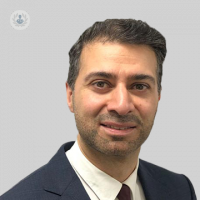Polymyositis - symptoms, diagnosis & treatment
Written in association with:Polymyositis is a potentially severe inflammatory condition of the muscles leading to muscle weakness and discomfort. It’s relatively uncommon, but having this condition can make it difficult to stand up from a seated or laying position, lift objects and walk up and down stairs.
Here, leading consultant rheumatologist from Greater Manchester, Dr Syed Asad Hussain guides us through the symptoms of polymyositis, the diagnostic procedures, causes and how it is managed.

What are the polymyositis symptoms?
Patients with polymyositis can present with progressive proximal muscle weakness - meaning the muscles of the shoulders, upper arms and around the thighs and hamstrings. As a result, the act of standing from a sitting position can become more and more difficult, and other daily activities such as climbing stairs or carrying heavy shopping bags can also be affected.
This progressive muscle weakness can therefore impact on the patient’s quality of life, mobility, abilities to pursue normal activities and lead to disability and dependency on others.
Aside from affecting the limb muscles, polymyositis can go progress and involve other muscular structures within the body such as the oesophageal muscle impairing the action of swallowing. Additionally, it can affect the respiratory muscles around the chest wall which can lead to shortness of breath.
What causes polymyositis and can it be prevented?
Polymyositis is a complex condition that may arise as a result of an interaction between genetic factors, immune mechanisms, environmental triggers and disability, which may be determined by other medical problems. The end result is that it can give rise to severe inflammation within the muscular structures.
Polymyositis requires an early diagnosis, as failure to treat it may lead to further muscular weakness and disability.
How is polymyositis diagnosed?
Once a patient has presented to a specialist with a clinical suspicion of polymyositis, the aim is to arrange three important investigations. This includes:
- Blood tests — this looks at the blood muscle enzyme creatine kinase (CK) which becomes very raised with the inflammation of the muscles
- Electromyography — this involves the placement of electrodes on the muscles to look at the electrical activity within the diseased or inflamed muscle
- Imaging — the use of an MRI scan can show the inflammation
For more diagnostic accuracy and confidence, a biopsy can be taken and analysed through a specialist histological examination. Therefore, a combination of raised muscle enzymes, abnormal neurological activity within the muscle on electromyography and a biopsy showing muscle inflammation confirm the diagnosis.
How is polymyositis managed?
Polymyositis should be treated with strong anti-inflammatory medication. This often involves high doses of steroids at the beginning. However, other medication, known as disease-modifying antirheumatic drugs or immunomodulatory treatment, is required to address the underlying immune mechanisms to switch off the condition. Most patients respond well to this treatment.
It ia advisable to visit a physiotherapist to strengthen the structures once inflammation settles.
However, a cohort of patients go on to develop progressive symptoms and alternative strategies are then needed, for example, the introduction of biologics therapy. These are more advanced therapies which need to be administered under the guidance of rheumatologists.
The overall management of polymyositis is through a multidisciplinary team approach, of which the rheumatologist has a central role. Aside from strong drug treatments which require careful monitoring, allied medical colleagues such as a physiotherapist, occupational therapist and clinical psychologists are immensely helpful.
Early detection of the condition can lead to a successful outcome and patients as well as their supporting family members should acquire good knowledge of the condition in order to self manage as best as possible.
If you are suffering from any of the symptoms mentioned in this article, you can book an appointment with Dr Syed Asad Hussain through his Top Doctors profile.


